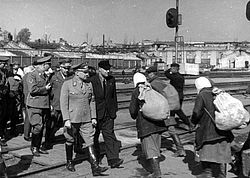Fritz Sauckel
Fritz Sauckel was born in 1894 in Haßfurt as the son of a seamstress and a postal clerk. At the age of 15 he dropped out of school and went to sea as a sailor for the Norwegian and Swedish merchant navy.
After the First World War, which he spent for the most part in a French internment camp, Sauckel carried out auxiliary work in a ball bearing factory. He was also active in right-wing radical organisations, joined the anti-Semitic "German Peoples' Protection and Defence League" and joined the NSDAP in 1923. After leading local and district organizations of the NSDAP, he became Gauleiter of Thuringia in 1927. As Minister of the Interior in 1932 he belonged to the first state government with participation of the NSDAP.
In 1942 Hitler appointed him "Generalbevollmächtigter für den Arbeitseinsatz". Behind it hid a special NS authority led by him, which was responsible for the recruitment of millions of people from all parts of Europe for forced labor in the Reich territory. These included the so-called "Sauckel Actions," in which hundreds of thousands of people from Eastern Europe were forcibly abducted.
After 1945 Fritz Sauckel was one of the 24 leading National Socialists accused by the International Military Tribunal in the "Nuremberg Trial against the Main War Criminals". The presiding judge described Sauckel as "the largest and cruellest slaveholder since the pharaohs". On October 1, 1946, Fritz Sauckel was unanimously convicted on two out of four counts. Sentenced to death, he was executed on 16 October 1946.


